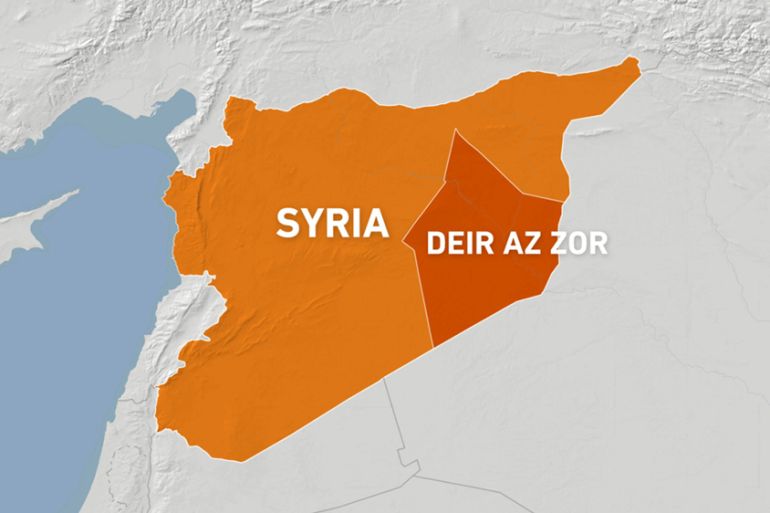Several killed in fighting between SDF and tribesmen in eastern Syria
The clashes that took place between Arab clans and the Syrian Democratic Forces in Deir Az Zor countryside are among the worst in recent years.

Clashes in eastern Syria between Arab tribal fighters and US-backed Kurdish-led fighters have left several people, including civilians, dead and others wounded, opposition activists and pro-government media have said.
The clashes, which continued on Wednesday, are among the worst in years in the region along the border with Iraq, where hundreds of United States troops have been based since 2015 to help in the fight against the ISIL (ISIS) armed group.
Keep reading
list of 3 itemsWhy are Syrians protesting in Sweida?
Syrian rebel group Hayat Tahrir al-Sham steps up anti-government operations
The clashes first broke out on Monday, a day after the US-backed, Kurdish-led Syrian Democratic Forces (SDF) detained the commander and several members of the Deir Az Zor Military Council, a group that had been allied with the SDF, at a meeting they invited them to in the northeastern city of Hassakeh.
The Britain-based Syrian Observatory for Human Rights, an opposition war monitor, reported that 10 Arab tribesmen and three SDF fighters were killed in clashes in the villages of Hrejieh and Breeha.
Another activist collective that covers news in the region, Deir EzZor 24, said eight civilians, including a nine-year-old boy, were killed in the village of Hrejieh, where the fighting was the most intense. Thirteen fighters belonging to Arab tribes were also killed, it said.
The pro-government Sham FM radio station said 10 people were killed in Hrejieh and Breeha and that dozens of civilians were wounded as well.
Resentment between Arab and Kurdish fighters
Arab tribesmen in the eastern province of Deir Az Zor were angered by the detention of Ahmad al-Khbeil, better known as Abu Khawla, who heads the Military Council, which was allied with the SDF in its years-long battle against ISIL in Syria.
On Wednesday, a joint statement issued on behalf of the SDF and the Military Council said that Abu Khawla had been removed from his position as commander, adding that he had been dismissed, along with four other leaders, for alleged involvement in “multiple crimes and violations”, including drug trafficking.
The confrontation has appeared to bring earlier resentments to the surface, as Arabs in the area voiced concern that Kurdish groups in the region may “erase its Arab identity”.
It also raised concerns of more divisions between Kurdish and Arab fighters in eastern Syria, where ISIL once enjoyed a wide presence and there are fears that it could take hold again.
Abu Khaled, a local journalist living in the Deir Az Zor countryside, told Al Jazeera the clashes reminded him of the violence that had transformed the Syrian uprising in 2011 into an all-out war.
“Because of the hot weather, families usually sleep on rooftops or in the fields, but they have avoided that for fear of being caught by a stray bullet,” he said.
“The main fear for civilians here is that international coalition warplanes could target them to bolster the SDF under the pretence of fighting ISIL and Iranian cells,” he continued.
“People are afraid of the SDF taking control of the territory, and thus erasing its Arab identity.”

Tribal condemnation
Arab tribes in Deir Az Zor have been vocal in their opposition to the SDF, with tribal leader Hasan al-Dabei accusing the SDF of using the clashes to encroach on more land.
“How can the US back a group that has been classified as terrorists [by Turkey] and is occupying Arab lands, plundering its riches, recruiting child soldiers?” he asked.
“We only want to return to our homes, and our hearts burn for what the SDF has done to our lands, from demographic engineering to changing our education curriculum and imposing their own traditions.”
The tribes issued statements of condemnation and expressed their willingness to participate in combat operations and to back the Military Council against the SDF.
A video circulated on social media showed members of the Bakr tribe gathered in the village of al-Harijiyeh in Deir Az Zor’s countryside, demanding the release of Abu Khawla and giving the US-backed forces 12 hours to deliver.
The recent tensions between the SDF and the Military Council began earlier this summer after Abu Khawla feared the council in Deir Az Zor would be replaced by the Sanadid Military Group, an affiliate of the SDF.
Clashes broke out between the members of the Military Council and SDF forces on July 25 after the former opposed the transfer of members belonging to the Sanadid east of the Euphrates River in Deir Az Zor.
Additional reporting by Ali Haj Suleiman in Idlib, Syria.